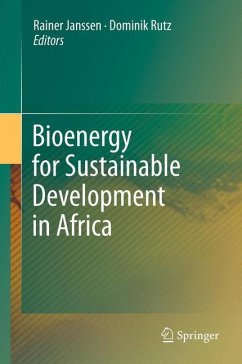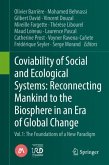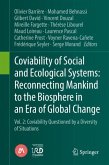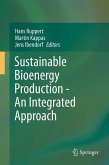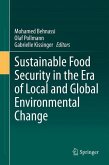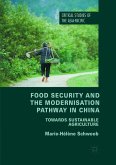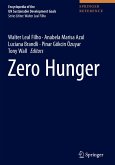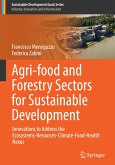Bioenergy for Sustainable Development in Africa
Herausgegeben:Rutz, Dominik; Janssen, Rainer
Bioenergy for Sustainable Development in Africa
Herausgegeben:Rutz, Dominik; Janssen, Rainer
- Gebundenes Buch
- Merkliste
- Auf die Merkliste
- Bewerten Bewerten
- Teilen
- Produkt teilen
- Produkterinnerung
- Produkterinnerung
The book Bioenergy for Sustainable Development in Africa is a response to the current global discussion on sustainability of biofuels which often neglects the needs and perspectives of developing countries. In five parts on Biomass Production and Use , Biofuel Technologies and Markets in Africa , Biofuel Policies , Sustainability of Biofuels , and Financing and Socio-Economic Issues the book addresses in 30 chapters bioenergy development opportunities for Africa and related risks. Contributions to this book are based on the experience of selected authors from Africa, Europe, and other…mehr
Andere Kunden interessierten sich auch für
![Coviability of Social and Ecological Systems: Reconnecting Mankind to the Biosphere in an Era of Global Change Coviability of Social and Ecological Systems: Reconnecting Mankind to the Biosphere in an Era of Global Change]() Coviability of Social and Ecological Systems: Reconnecting Mankind to the Biosphere in an Era of Global Change111,99 €
Coviability of Social and Ecological Systems: Reconnecting Mankind to the Biosphere in an Era of Global Change111,99 €![Coviability of Social and Ecological Systems: Reconnecting Mankind to the Biosphere in an Era of Global Change Coviability of Social and Ecological Systems: Reconnecting Mankind to the Biosphere in an Era of Global Change]() Coviability of Social and Ecological Systems: Reconnecting Mankind to the Biosphere in an Era of Global Change95,99 €
Coviability of Social and Ecological Systems: Reconnecting Mankind to the Biosphere in an Era of Global Change95,99 €![Sustainable Bioenergy Production - An Integrated Approach Sustainable Bioenergy Production - An Integrated Approach]() Sustainable Bioenergy Production - An Integrated Approach110,99 €
Sustainable Bioenergy Production - An Integrated Approach110,99 €![Sustainable Food Security in the Era of Local and Global Environmental Change Sustainable Food Security in the Era of Local and Global Environmental Change]() Sustainable Food Security in the Era of Local and Global Environmental Change77,99 €
Sustainable Food Security in the Era of Local and Global Environmental Change77,99 €![Food Security and the Modernisation Pathway in China Food Security and the Modernisation Pathway in China]() Marie-Hélène SchwoobFood Security and the Modernisation Pathway in China63,99 €
Marie-Hélène SchwoobFood Security and the Modernisation Pathway in China63,99 €![Zero Hunger Zero Hunger]() Zero Hunger463,99 €
Zero Hunger463,99 €![Agri-food and Forestry Sectors for Sustainable Development Agri-food and Forestry Sectors for Sustainable Development]() Francesco MeneguzzoAgri-food and Forestry Sectors for Sustainable Development88,99 €
Francesco MeneguzzoAgri-food and Forestry Sectors for Sustainable Development88,99 €-
-
-
The book Bioenergy for Sustainable Development in Africa is a response to the current global discussion on sustainability of biofuels which often neglects the needs and perspectives of developing countries. In five parts on Biomass Production and Use , Biofuel Technologies and Markets in Africa , Biofuel Policies , Sustainability of Biofuels , and Financing and Socio-Economic Issues the book addresses in 30 chapters bioenergy development opportunities for Africa and related risks. Contributions to this book are based on the experience of selected authors from Africa, Europe, and other continents, including researchers, investors, policy makers and other stakeholders such as representatives from NGOs.
This publication builds upon the results of the COMPETE Bioenergy Competence Platform for Africa which was supported by the European Commission in the 6th Framework Programme for Research from January 2007 to December 2009.
This publication builds upon the results of the COMPETE Bioenergy Competence Platform for Africa which was supported by the European Commission in the 6th Framework Programme for Research from January 2007 to December 2009.
Produktdetails
- Produktdetails
- Verlag: Springer / Springer Netherlands
- Artikelnr. des Verlages: 80074526, 978-94-007-2180-7
- 2012
- Seitenzahl: 444
- Erscheinungstermin: 3. November 2011
- Englisch
- Abmessung: 241mm x 160mm x 29mm
- Gewicht: 762g
- ISBN-13: 9789400721807
- ISBN-10: 9400721803
- Artikelnr.: 33617261
- Verlag: Springer / Springer Netherlands
- Artikelnr. des Verlages: 80074526, 978-94-007-2180-7
- 2012
- Seitenzahl: 444
- Erscheinungstermin: 3. November 2011
- Englisch
- Abmessung: 241mm x 160mm x 29mm
- Gewicht: 762g
- ISBN-13: 9789400721807
- ISBN-10: 9400721803
- Artikelnr.: 33617261
Rainer Janssen graduated in Physics (Dr. rer.nat.) at the Technical University of Munich, Walter Schottky Institute, Germany and performed studies at the University of Toronto, Canada. He is Head of the Biomass Department at WIP Renewable Energies and Senior Expert in the Biomass field. He is involved in the production, distribution and market penetration of bioenergy (solid biomass, biogas) and biofuels for transport (e.g. bioethanol, biodiesel, vegetable oil) with special emphasis on the development of supportive framework conditions and policy regulations in the EU, Latin America, Africa and other emerging economies. Since 2000, Dr. Janssen is involved in the coordination of a variety of international and European projects. Recent projects include the FP7 project Global-Bio-Pact focussing on socio-economic impacts of biomass and bioproducts on a global level, the FP7 project BioTop on biofuels assessment on technical opportunities and research needs for Latin America, and the international competence platform COMPETE (FP6) on the sustainable use of energy crops and agro-forestry systems in Africa. In recent years, Dr. Janssen was invited expert in the field of bioenergy for the European Commission (DG RTD, DG TREN), IEA (International Energy Agengy) Bioenergy, and the GIZ (Deutsche Gesellschaft für Technische Zusammenarbeit). Since 2009, Dr. Janssen is member of working group 4 on "Sustainability" of the European Biofuels Technology Platform and member of working group 4 on "Market & Policies Development" within the Biomass Panel of the European Technology Platform on Renewable Heating and Cooling. Dominik Rutz graduated in Environmental Science (Dipl.-Ing.) and Consumer Science (M.Sc.) at the Technical University of Munich, Germany, and the Institut National d'Horticulture, France. He is Senior Expert at WIP Renewable Energies and his main field of experience includes market support and international cooperationon bioenergy in developing countries and emerging economies worldwide. >East (Biogas for Eastern Europe) and UrbanBiogas (Urban Waste for Biogas Production). He is author of three handbooks on biogas, liquid biofuels, and biomass heating systems, and furthermore invited expert and lecturer e.g. for a course on 2nd generation biofuels at UNAM (Universidad Nacional Autónoma de México) and REMBIO (Red Mexicana de Bioenergía). While travelling to more than 40 countries worldwide and stimulated by his diploma thesis on vegetation ecology in the Okavango Delta in Botswana in 2004, his main fascination is dedicated to the beauty of nature and cultural spirit of the African continent. Nature conservation on the one hand and social equity on the other hand are the main drivers for his engagement in decentralised renewable energy supply. Thereby his interest goes far beyond the bioenergy field, towards a holistic and sustainable energy system.
Part I: Biomass Production and Use.- 1. Keynote Introduction: Traditional and Improved Use of Biomass for Energy in Africa.- 2. Biomass Potential in Arid and Semi-arid Regions in Botswana.- 3. Jatropha - A Promising Crop for Africa's Biofuel Production?- 4. Small-scale Production of Jatropha in Zambia and Its implications for Rural Development and National Biofuel Policies.- 5. Economic Evaluation of Sweet Sorghum in Biofuel Production as a Multi-purpose Crop: The Case of Zambia.- Part II: Biomass Technologies and Markets.- 6. Keynote Introduction: Biomass Technologies and Markets in Africa.- 7. Sustainable Charcoal and Firewood Production and Use in Africa.- 8. Bioethanol Potential and Production in Africa: Sweet Sorghum as a Complementary Feedstock.- 9. Biodiesel Production in Africa.- 10. Biogas Production in Africa.- 11. New Conversion Technologies For Liquid biofuels Production in Africa.- 12. Modern use of solid biomass in Africa: Prospects for Utilisation of Agro-waste Resources in Nigeria.- 13. International Trade of Biofuels: Current Trends and the Potential Role of Africa.- Part III: Biomass Policies.- 14. Keynote Introduction: Overview on Bioenergy Policies in Africa.- 15. Biofuel Policies in Tanzania.- 16. Biofuel Policy in South Africa: A Critical Analysis.- 17. Promoting Biofuels in West Africa: An Engine For Development.- 18. Strategies For a Sustainable Pan-African Biofuels Policy.- Part IV: Sustainability of Biomass Production and Use.- 19. Keynote Introduction: Sustainability Considerations for Biofuels Production in Africa.- 20. Environmental Impacts of Biofuel Production in Africa.- 21. Potential Impacts of Biofuel Development on Biodiversity in Chobe District, Botswana.- 22. Water Implications of Biofuel Development in Semi-arid Sub-Saharan Africa: Case Studies of Four Countries.- 23. Implications of Climate Change on Sustainable Biofuel Production in Africa.- 24. Bioenergy and Sustainable Adaptation to Climate Change in Africa.-Part V: Financing and Socio-economic Issues.- 25. Keynote Introduction: Socio-economic Impacts of Different Scales of Biofuel Production in Africa.- 26. Social Impacts of Biofuel Production in Africa.- 27. Small-scale Bioenergy Initiatives: Lessons from Case Studies in Asia, Latin America and Africa.- 28. Gender Issues of Biomass Production and Use in Africa.- 29. Financing of Biofuel Projects in Africa.- 30. Economics of Modern and Traditional Bioenergy in African Households: Consumer Choices for Cook Stoves.- Part VI: Summary and Conclusion.- 31. Opportunities and Risks of Bioenergy in Africa.- Index.
Part I: Biomass Production and Use.- 1. Keynote Introduction: Traditional and Improved Use of Biomass for Energy in Africa.- 2. Biomass Potential in Arid and Semi-arid Regions in Botswana.- 3. Jatropha - A Promising Crop for Africa's Biofuel Production?- 4. Small-scale Production of Jatropha in Zambia and Its implications for Rural Development and National Biofuel Policies.- 5. Economic Evaluation of Sweet Sorghum in Biofuel Production as a Multi-purpose Crop: The Case of Zambia.- Part II: Biomass Technologies and Markets.- 6. Keynote Introduction: Biomass Technologies and Markets in Africa.- 7. Sustainable Charcoal and Firewood Production and Use in Africa.- 8. Bioethanol Potential and Production in Africa: Sweet Sorghum as a Complementary Feedstock.- 9. Biodiesel Production in Africa.- 10. Biogas Production in Africa.- 11. New Conversion Technologies For Liquid biofuels Production in Africa.- 12. Modern use of solid biomass in Africa: Prospects for Utilisation of Agro-waste Resources in Nigeria.- 13. International Trade of Biofuels: Current Trends and the Potential Role of Africa.- Part III: Biomass Policies.- 14. Keynote Introduction: Overview on Bioenergy Policies in Africa.- 15. Biofuel Policies in Tanzania.- 16. Biofuel Policy in South Africa: A Critical Analysis.- 17. Promoting Biofuels in West Africa: An Engine For Development.- 18. Strategies For a Sustainable Pan-African Biofuels Policy.- Part IV: Sustainability of Biomass Production and Use.- 19. Keynote Introduction: Sustainability Considerations for Biofuels Production in Africa.- 20. Environmental Impacts of Biofuel Production in Africa.- 21. Potential Impacts of Biofuel Development on Biodiversity in Chobe District, Botswana.- 22. Water Implications of Biofuel Development in Semi-arid Sub-Saharan Africa: Case Studies of Four Countries.- 23. Implications of Climate Change on Sustainable Biofuel Production in Africa.- 24. Bioenergy and Sustainable Adaptation to Climate Change in Africa.-Part V: Financing and Socio-economic Issues.- 25. Keynote Introduction: Socio-economic Impacts of Different Scales of Biofuel Production in Africa.- 26. Social Impacts of Biofuel Production in Africa.- 27. Small-scale Bioenergy Initiatives: Lessons from Case Studies in Asia, Latin America and Africa.- 28. Gender Issues of Biomass Production and Use in Africa.- 29. Financing of Biofuel Projects in Africa.- 30. Economics of Modern and Traditional Bioenergy in African Households: Consumer Choices for Cook Stoves.- Part VI: Summary and Conclusion.- 31. Opportunities and Risks of Bioenergy in Africa.- Index.

